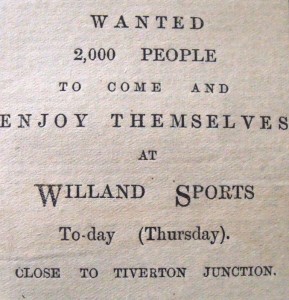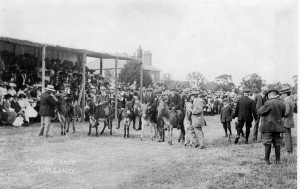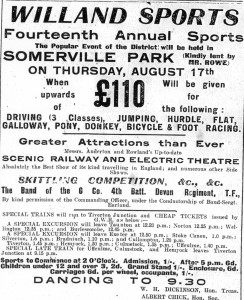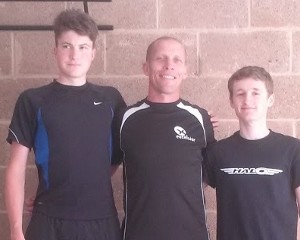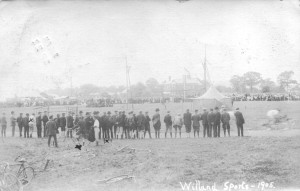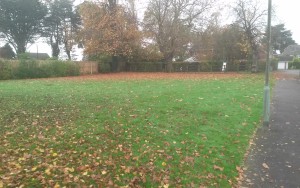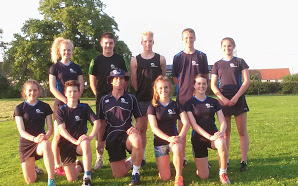Willand Sports Day 1898-1926
Willand’s History as an Athletic Centre
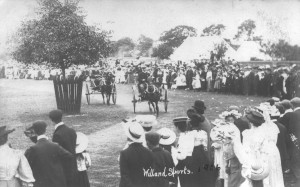 It is hard to believe now, but Willand used to host one of the foremost events in the Westcountry’s sporting calendar.
It is hard to believe now, but Willand used to host one of the foremost events in the Westcountry’s sporting calendar.
Between 1898 and 1926, with a six year break for the First World War, the famous Willand Sports – which included cycling, ‘foot’ and horse racing – attracted top sportsmen from across southern England and Wales, and at its peak drew crowds of over 6,000.
James Morrison of the Willand History Group has kindly researched and written this guest post.
Early days of Willand Sports
In the late-1800s most rural parishes put on a modest event every August, perhaps a fete, gymkhana, flower show or athletic sports. After some initial scepticism about whether it would be too ambitious, in 1898 villagers in Willand organised a sports day.
It was held in the grounds of Somerville House, where a grass track was cut and rolled for the running and bicycle races – roughly where Somerville Park now is – and a course for the horse racing was cut through the surrounding fields.
There were ‘local’ and ‘open’ races, with categories for boys and girls, men and women, and many of the races employed a system of handicapping to ensure maximum entertainment at the finish. Even the elderly were catered for with a ‘walking race for local men aged over 60’; in 1899 the overeager 67-year-old Tom Bass was ‘disqualified for running’, so handing victory to his younger and more restrained brother, 65-year-old John Bass.
Indeed, several events were included for the sheer potential for mishap and amusement.
The second sports included a half-mile obstacle race that required competitors to run half a lap of the track to collect their bicycles, which they then had to wheel backwards to the start line, where they had to put on a top hat, light a cigarette and then ride a lap of the track with the cigarette remaining alight.
The programme of horse racing was similarly enlivened by the popular donkey race. This press description of the 1909 race gives a flavour of proceedings:
“On the signal for the start being given some of the Neddies remained firm; others rushed off at a fair pace and then came to sudden stops with unpleasant consequences to their riders, who came sprawling to the ground.
When the race was half over friends of the riders rushed on to the course to try and get the donkeys to go quicker; they were soon ordered off by the stewards. A donkey named ‘March Past’, belonging to Mr Coleman, of Cullompton, had in the meantime been making the running and maintaining its lead, won easily.
Mr Salter’s ‘Maggie’ another Cullompton donkey, signalled its winning the second prize by kicking up its heels as it passed the judge … After the race had been won a couple of the donkeys, which had so far shown no disposition to race, started off at a good pace.”
Willand’s serious sportsmen
While spectators and competitors alike came to Willand Sports for entertainment, often as a welcome break from tough and monotonous working lives, the serious cycle, running and horse races were keenly contested.
This was not least due to the generous prize money on offer, which increased from £20 in 1898 to £180 by the 1920s and encouraging competitors to come from all around the country.
In 1910, for example, cyclists came from as far away as Wisbech in Cambridgeshire and Spalding in Lincolnshire, such was the reputation of Willand Sports.
Local sportsmen were also keen to compete. Two days before the inaugural sports, local cyclist Frank Sanders had been putting in the hours out on his bike, when he collided with a donkey and cart and was thrown from his cycle, breaking his collar bone in two places – traffic hazards being a familiar problem for training cyclists, though there are probably fewer donkey and carts around today.
One of the ‘champions’ of the Willand Sports was cyclist ‘Jesse’ James Marshall, a builder who lived in Willand ‘old’ village. He dominated the local cycling races for a number of years and once famously won the open competition against some of southern England’s top cyclists.
His triumphs occasionally courted controversy, such as in 1899 when he was declared winner of the 5 mile bicycle race (30 laps of the track).
Of the 12 starters, five had dropped out by the last mile, with Marshall leading for much of the race. Then, in an exciting finish, he was overtaken by two rivals at the line – one was from Bradfield, the other from Cullompton.
However, Marshall was declared the winner because the two non-Willanders were judged to have been a lap behind (accurate recording of laps was a reoccurring issue in the early days). Such was the furore this provoked the race was held again at a later date (the outcome is unknown, pending further research).
Why was Willand Sports so successful?
After the unpredicted success of the first sports, with an attendance of over 1,000, Willand Sports went from strength to strength each successive year. The crowds eventually averaged out at around 6,000, and even the six year break for the First World War does not seem to have dented its popularity, with crowds reaching similar numbers in the early-1920s
There was much contemporary speculation as to how little Willand was able to host such a large and successful event. The main reasons were:
- Location, as Willand was at a pivotal point in the local road system, and more importantly the sports ground was only a three minute walk from Tiverton Junction Railway Station. Trains, some specially commissioned for the day, kept the crowds pouring in from all around, and as far away as Bristol and Plymouth.
- The organisation and ‘excellent management’ of a ‘businesslike committee’, which of course depended on the hard work and voluntary endeavour of local men an women.
- The liberal prize money and an entertaining programme of events that was recognised as the ‘most varied and interesting’ in the region.
There were other factors at play such as a reputation for good weather and favourable timing; the sports coincided with when many ‘up-country athletes’ were taking their holidays in the Westcountry, and (of concern to many locals) it fell between the hay and corn harvests.
Then, of course, there were the other entertainments that accompanied the sports. There were beer and food tents, an array of sideshows and fairground rides, including ‘wild beast’ shows, shooting galleries, roundabouts, coconut shies, hoop-la, ‘flip-flaps’, ‘swing boats’ and the steam powered merry-go-rounds that were so popular at the time.
It was only after the sporting events had concluded that the fairground ‘hurly-burly’ really got going, and then day was rounded off with dancing till late at the Assembly Room at Tiverton Junction.
The demise of Willand Sports
In the mid-1920s circumstances began to change for Willand Sports, reflecting broader changes in society. By then just about every neighbouring parish was holding its own August show or sports, so people were spoilt for choice, but, with a worsening economy, had less money to spend on leisure.
More specifically, when Somerville House was sold to new owners in 1924, Willand Sports had to change location to ‘Harpitt Park’ – roughly where Harpitt Close now is. This changed the dynamics of the event and even the slightly further walking distance from the railway station made a difference.
The new location proved to be more conducive to a first rate racecourse, and so horse racing became the ‘outstanding feature’, although perversely this proved to be the sports’ undoing.
Because of the popularity of the horse racing in 1925, the decision was made to make 1926 exclusively a horse racing event – Willand Races. It was considered a ‘bold departure’, but the committee felt they were “adapting themselves to altered circumstances and catering for what was conceived to be a changed public taste.”
Unfortunately, the 1926 Willand Races proved a huge disappointment with attendance down to 1,200, a far poorer turnout than even the pessimists had predicted. The lack of variety had deterred the family groups that had once flocked to the sports and it had become an event solely for dedicated horse racing enthusiasts.
There was no similar event held the following year, or thereafter. It seems probable the committee recognised that the heyday of popular local sports events encompassing a variety of different sports was over. Even musical tastes had changed: rather than the traditional wind and string bands of Victorian times that had once accompanied the evening’s dancing after the sports, those who attended the 1926 Willand Races ended up dancing the night away to the strains of the Halberton Jazz Band.
Sources
The majority of information about Willand Sports, and any quotation featured in the above article, comes from press reports in either the Devon & Somerset Weekly News or the Tiverton Gazette.
Research into Willand Sports is ongoing and we would love to hear from you if you have any further information, comment or correction. Please contact James Morrison, Willand History Group on 01884 250057 of jamorrison235@gmail.com.
Current Athletic Training in Willand
Fear not interested readers, the Excelsior Athletic Development Club is currently encouraging a resurgence of sporting endeavour. Our young gymnasts, weightlifters and runners all train weekly in Willand.
We have Regional and International Sports people coming from afar to get expert coaching from Head Coach James Marshall (no relation to “Jesse” James Marshall the builder!)

